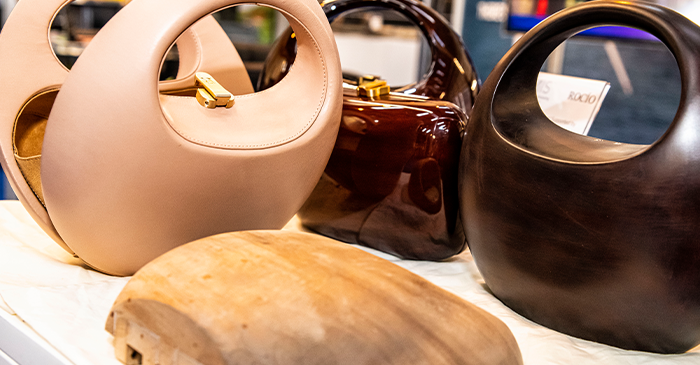Rocio
3D printing provides material and time savings to luxury fashion brand
Background
A team from the National Manufacturing Institute Scotland’s (NMIS) Digital Factory collaborated with luxury eco-fashion brand ROCIO, worn by celebrities including Kate Upton and Irina Shayk, to create a new version of its signature handbag design using 3D printing.
The brand was eager to explore new, sustainable ways of manufacturing and combine the technological capabilities at NMIS with its own craftsmanship to develop the inner structure of the bag that could be used as the basis for luxury fabric coverings.
Customer challenge
Founded in Scotland, ROCIO is renowned for its decorative handbags, traditionally individually sculpted from harvested acacia wood over a meticulous 19 stage process. However, this process is lengthy and leaves little opportunity to explore alternative design ideas.
The brand was also eager to uncover additive manufacturing capabilities, which can provide materials and energy savings, making them more sustainable than traditional manufacturing techniques
How did NMIS help?
As part of the project, funded by the Advancing Manufacturing Challenge Fund's Additive Manufacturing Business and Technology Support (AM-BATS) project, the team from NMIS initially scanned ROCIO's signature Coco handbag design before producing a 3D printed prototype of the inner structure of the bag using a Stratasys F900 printer. The goal was to ensure the design retained its signature characteristics in aesthetic and silhouette.
Atelier, a fashion business school in Spain, used this prototype to create a final fully structured leather handbag – a first for ROCIO.

Hamish Menzies, ROCIO Creative Director said:
We are really taken aback by the results. We're at the heart of sustainable fashion and take pride in each accessory being a uniquely creative masterpiece. The pieces produced are works of art and this unique leather handbag concept delivers outstanding beauty in a structured art form which I believe pushes the boundaries of design."
"For us, exploring the use of a 3D printed prototype is more cost, time and material efficient in the long term. Through using this technology, we are one step closer to improving our endeavours to be even more sustainable, whilst unlocking and embracing the future capabilities of our industry.
Business impact
By embracing this new manufacturing method, ROCIO expects to see significant long-term cost, time and material savings. These savings also connect strongly to the brand's core ethos and desire to be more sustainable.
The new process also allows ROCIO to explore new shapes and designs to take to market as the bags can now be produced quickly and efficiently, often within a few days compared to previously taking several weeks.
A reinvented signature ROCIO handbag is set to debut at Paris Fashion Week next season in March.
The Advancing Manufacturing Challenge Fund
The Advancing Manufacturing Challenge Fund projects are part-funded by the 2014-2020 European Regional Development Fund and the European Structural Funds 2014-20 Programme.
The Scottish Government is the Managing Authority for the European Structural Funds 2014-20 Programme.
For further information visit the Scottish Government webpages or follow @scotgovESIF.
